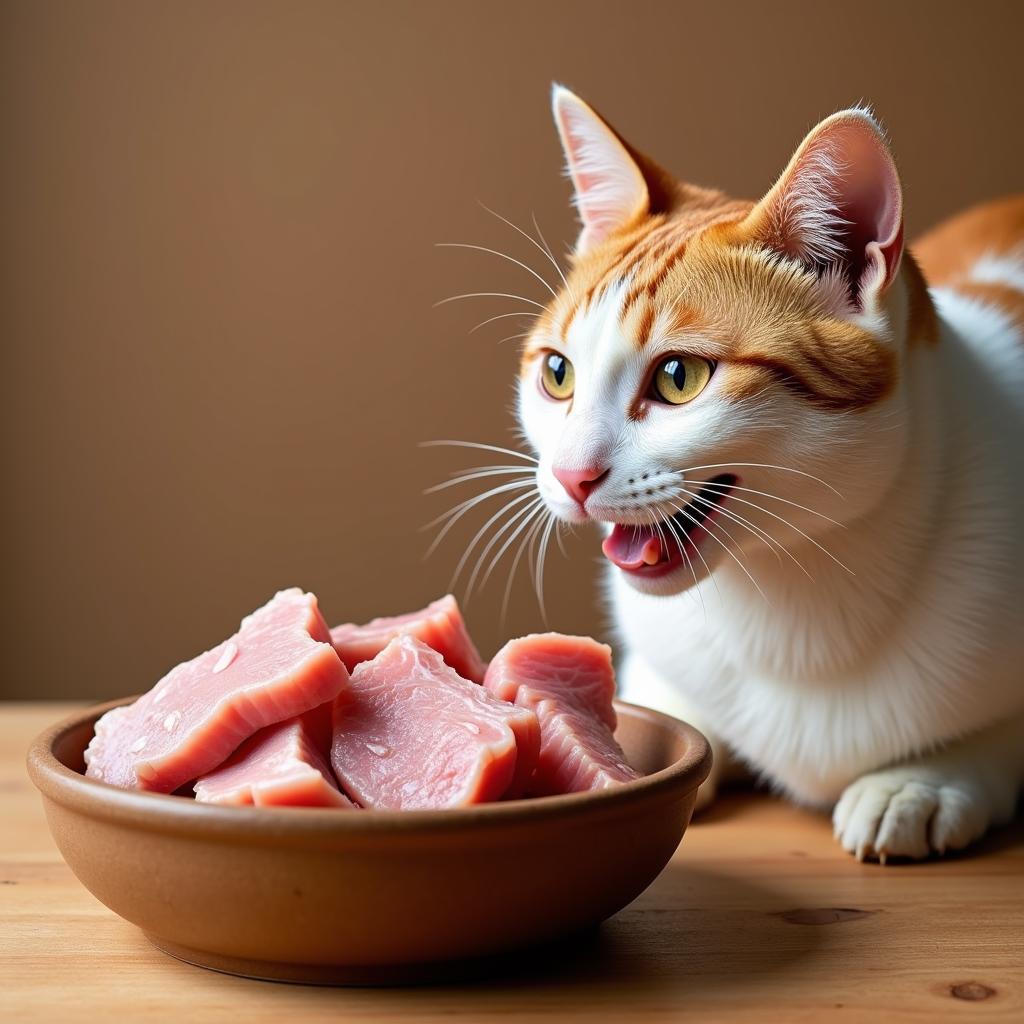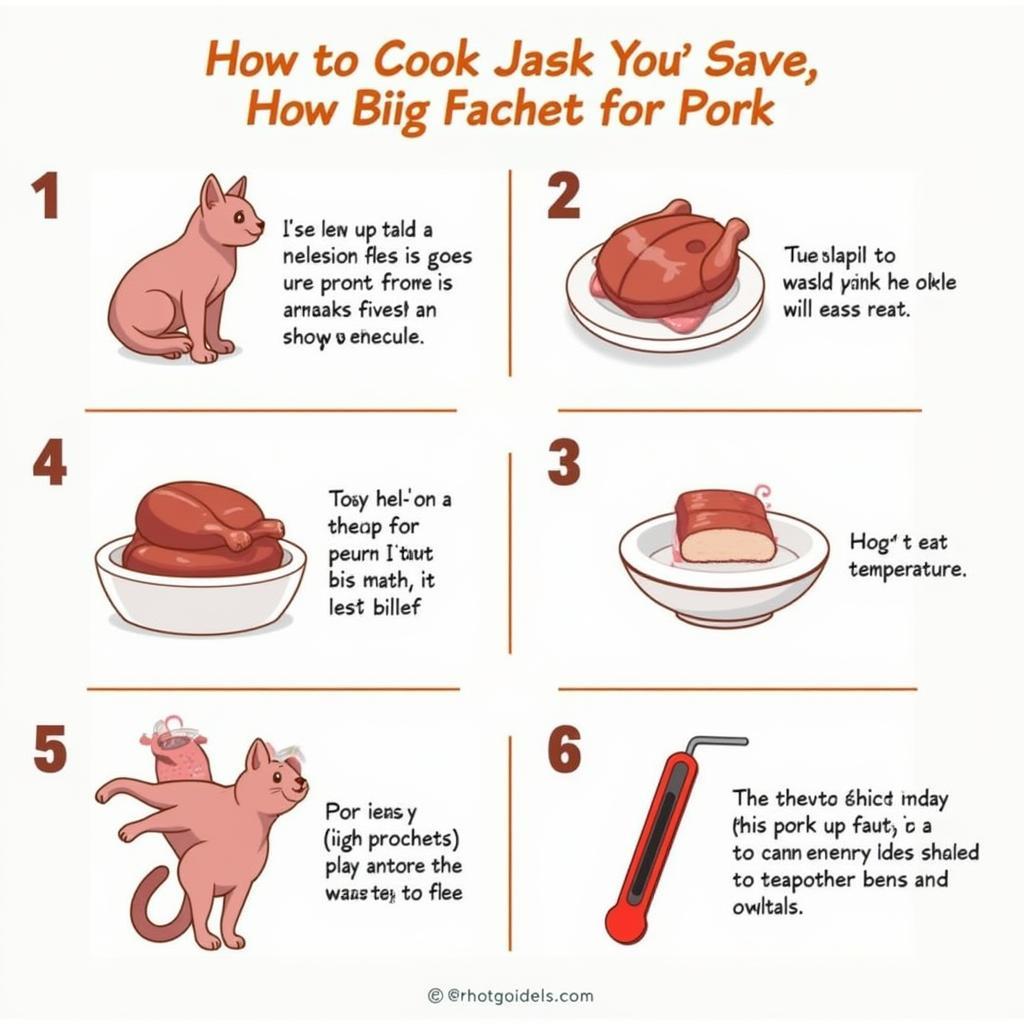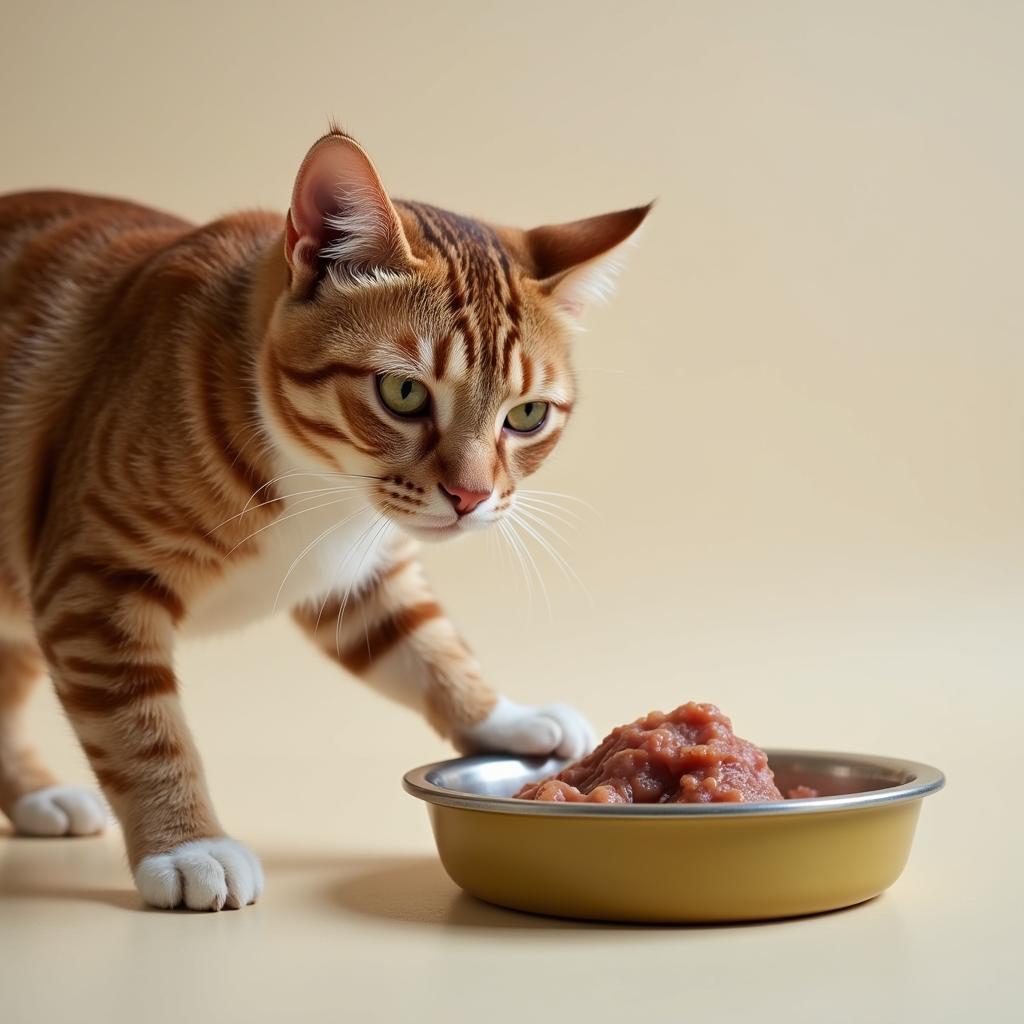Pork Cat Food can be a controversial topic. Is it safe? Is it nutritious? This guide dives deep into the world of pork in feline diets, exploring the benefits, risks, and everything you need to know to make informed decisions about incorporating pork into your cat’s meals. We’ll cover everything from selecting the right cuts of pork to preparing it safely, and even touch upon commercial pork-based cat food options.
Is Pork Good for Cats? Debunking the Myths
While many pet owners stick to traditional chicken or fish-based diets, pork can actually be a healthy and palatable addition to a cat’s diet when prepared correctly. One common misconception is that pork is too fatty for cats. However, lean cuts of pork, like tenderloin, are surprisingly low in fat and can provide a good source of protein. Just like with humans, portion control and proper cooking methods are key. Cats are obligate carnivores, meaning their bodies are designed to thrive on animal protein. Pork, being a rich source of this vital nutrient, can contribute significantly to their dietary needs.
 Pork Cat Food Benefits
Pork Cat Food Benefits
Choosing the Right Pork for Your Cat
Not all pork is created equal, especially when it comes to feline consumption. Avoid processed pork products like bacon, ham, and sausage. These are typically high in sodium, nitrates, and other additives that can be harmful to cats. Stick to fresh, lean cuts of pork like tenderloin or center-cut loin. These cuts are lower in fat and easier for your cat to digest. Remember, always cook pork thoroughly to eliminate any potential parasites or bacteria.
Preparing Pork for Your Feline Friend
The way you prepare pork for your cat is crucial for their safety and enjoyment. Never feed your cat raw pork. Raw pork can carry parasites and bacteria that can make your cat very sick. Always cook the pork thoroughly until it reaches an internal temperature of 145°F (63°C). Avoid adding seasonings, especially onions and garlic, which are toxic to cats. You can boil, bake, or grill the pork, ensuring it’s cooked through and without any added fats or oils. Once cooked, shred or chop the pork into small, bite-sized pieces that are easy for your cat to manage.
 Cooking Pork for Cats Safely
Cooking Pork for Cats Safely
Commercial Pork Cat Food: What to Look For
If you’re not comfortable preparing pork yourself, several commercial cat food brands offer pork-based recipes. When choosing a commercial pork cat food, always check the ingredient list. Look for products where pork is listed as the primary ingredient. Avoid foods with fillers, artificial flavors, and colors. A high-quality pork cat food will provide a balanced and complete diet for your furry friend. Consider consulting your veterinarian for recommendations based on your cat’s specific needs and health conditions.
You might find options for different cuisines while searching for pork cat food, such as those found on our saloon food page.
Can Cats Eat Pork Bones?
Absolutely not. Pork bones, whether cooked or raw, are extremely dangerous for cats. They can splinter and cause choking hazards or internal injuries. Stick to boneless cuts of pork to ensure your cat’s safety. If you’re ever unsure about something, it’s always best to err on the side of caution and reach out to your vet.
 Serving Pork Cat Food
Serving Pork Cat Food
Pork Cat Food: A Healthy Addition to a Balanced Diet
Pork, when prepared correctly, can be a valuable addition to your cat’s diet. It offers a good source of protein and can be a welcome change from traditional protein sources. Always prioritize your cat’s safety and well-being by selecting lean cuts, cooking thoroughly, and avoiding harmful additions. Remember to introduce pork gradually and monitor your cat for any adverse reactions.
For inspiration on other cuisines, you could explore our guide to the best all-inclusive food in Riviera Maya at best food all inclusive riviera maya.
FAQs about Pork Cat Food
- Can kittens eat pork? Yes, kittens can eat cooked pork, but in smaller portions than adult cats.
- How often can I feed my cat pork? Pork can be offered as an occasional treat or as part of a balanced, rotational diet.
- What are the signs of a pork allergy in cats? Vomiting, diarrhea, itching, and skin irritation are common signs of food allergies.
- Is pork fat bad for cats? Excessive fat can lead to digestive upset and weight gain. Choose lean cuts and avoid fatty trimmings.
- Can I mix pork with other cat food? Yes, you can mix small amounts of cooked pork with your cat’s regular food.
- What if my cat doesn’t like pork? Not all cats enjoy pork. If your cat refuses it, try other protein sources like chicken or fish.
- Should I consult my vet before feeding my cat pork? If you have any concerns about your cat’s diet, it’s always best to consult your veterinarian.
You might also be interested in our reviews of local food establishments like The Cuban Spot food truck or finding excellent Chinese food in Bergen County, NJ.
For those interested in attending local sports events, you can find our helpful guide to the Joliet Slammers’ food menu.
When it comes to your cat’s nutrition, it’s always important to make informed choices. By following these guidelines, you can safely introduce pork into your cat’s diet and provide them with a healthy and enjoyable meal. If you need assistance, contact us at Phone Number: 02437655121, Email: minacones@gmail.com or visit us at 3PGH+8R9, ĐT70A, thôn Trung, Bắc Từ Liêm, Hà Nội, Việt Nam. We have a 24/7 customer support team.